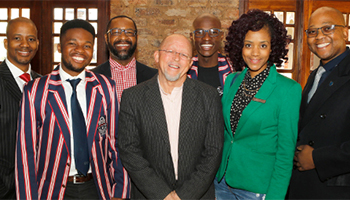
The Student Representative Council (SRC) launched the SRC Fund
at a Business Breakfast on the Bloemfontein Campus.
Photo: Johan Roux
The Student Representative Council (SRC) is not just asking for financial help, but is taking the lead by launching the SRC Fund. According to different guest speakers at a recent SRC Business Breakfast, the student leadership of the University of the Free State (UFS) is setting an example.
“They (the SRC) are saying to us and to you: We are not just saying that we want free education in our lifetime. We are also prepared to assist government in assisting universities however we can in that direction,” says Pura Mgolombane, Dean of Student Affairs at the UFS.
Objectives of fund
The SRC launched the SRC Fund on 4 August 2017 at the Centenary Complex on the Bloemfontein Campus in order to fight against financial exclusion of students. The fund aims to centre all forms of fundraising initiatives by students, decreasing financial barriers to UFS entry, and utilising and maximising networks within business enterprise, former SRC members, alumni, and student fundraising initiatives. It also wants to help with the creation of exposure and mentorship programmes, funds to assist with registration and financial exclusions, entrepreneur development, partnership opportunities, and increasing employment opportunities.
Initiatives such as Right2Learn will in future form part of the fund, and fundraising initiatives such as The Cycle Tour and Kovsies Biggest Braai has also been launched.
Internal and external partnerships
Prof Nicky Morgan, Vice-Rector: Operations at the UFS, says the SRC leadership is not just asking for money. He says they are a “can do leadership” who is asking others to help them to be successful. He also stressed the important relationship between the university and the city and asked that they should work together.
Sikhululekile Luwaca, President of the Bloemfontein SRC, said the SRC wants to “build internal and external partnerships, because universities are microcosms of society”.
“We cannot do it alone and that is why we are trying to bring the business part of it, the corporate enterprise, to also assist the SRC Fund to become sustainable.”